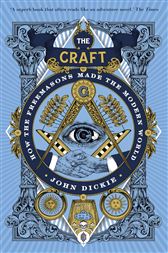I just finished the hard copy (hardback too boot) and was impressed with what I thought was how well researched it appears to be. Of course being an outsider who isn't even a mason yet I can't comment on the accuracy of what's in it. It was a page turner for me though and that could likely be because I'm keen to learn as much about Freemasonry, it's history and it's impact in the world, from the only sources available to me currently and ones that I sense may have some credibility due to the way things are presented.
I avoided the second chapter as it describes the three degree rituals in some detail and I didn't want to spoil the intitiation experiences for myself if and when I get to them. There are also a few more chapters devoted to Italian masonry than to others which could be because the author is a historian and commentator who has specialised in Italy.
I was very interested to learn that masonry may have had its genesis in the Schaw lodges of the late 16th century in Stuart Scotland and that Dickie implies that the Templar connection may have been part wishful thinking on the part of French masons led by one Andrew Ramsay, part grandeur and the need to create a colourful "origin narrative"; and partly the desire to bring a Catholic flavour to Freemasonry. I had read about the schism between the Antients and the Moderns elsewhere but Dickie claims that this may have been due to the creation of the Royal Arch degree.
The key takeaways and validations for an aspiring mason like me are three: first, that Freemasonry has not changed in essence and is "a fellowship of men...bound by oaths to a method of self betterment...". Second, that secrecy together with the vast array of historical personalities that have been masons has been a strong contributor to what makes it "attractive and compelling"; and finally that Freemasonry has definitely influenced and impacted the world we live in very often positively.
I hope I haven't broken any rules in writing this. Please excuse me if I have.
https://johndickie.net/books/the-craft/how-i-came-to-write-the-craft/

